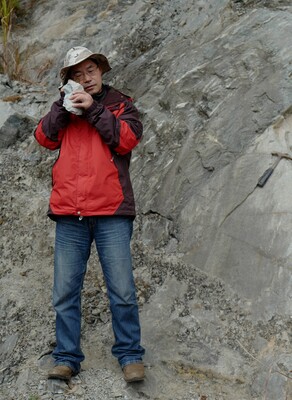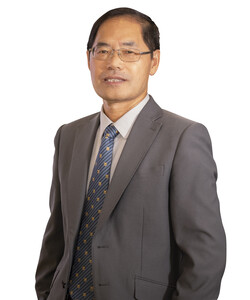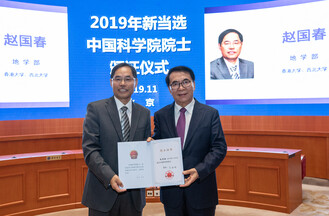Professor Guochun ZHAO
Chair Professor, Department of Earth Sciences
Research interests: Metamorphic Petrology, Precambrian Geology and Supercontinents
Research achievements: Discoveries of two 1.95-1.85 billion years old continental collisional belts in North China, recognition of global-scale 2.0-1.8 Ga collisional events leading to the assembly of a supercontinent and a new reconstruction of East Asian continental blocks in supercontinent Pangea.
For decades, eminent Earth Scientist Professor Guochun Zhao has dedicated himself to researching plate tectonics and supercontinents. His inimitable research has unraveled the fundamental yet unsolved conundrums regarding when plate tectonics began to shape the Earth's surface. It has also revealed how the continental blocks have periodically assembled into supercontinents and subsequently disassembled throughout the Earth’s history.
It was a drizzling day when Professor Zhao met us at the Stephen Hui Geological Museum for a portrait session. Suddenly, he got excited when spotting a panel poster explaining Precambrian geology, and he told us it is one of the focal areas that his research interest lies. That marked the beginning of our interview, followed by chatter and laughter that centred around his challenging yet fulfilling research journey. Despite the wet and chill weather outside, the burning passion in his eyes was too noticeable to be neglected.
_1671093791.jpg)
Professor Zhao as a MPhil student at Changchun College at Geology in 1987.
From a serendipitous start to a pioneering career

‘So, how did you become a researcher in the first place?’ Thinking the story was such a cliché to tell, this question put a smile on the amiable gentleman’s face. Growing up in a rural area in Liaoning of Mainland China, Professor Zhao had long been captivated by the peculiar textures and colours of rocks that one could find everywhere. His interest grew when observing the intriguing fieldwork of the national geology team in his village. His childhood encounters might have been inspiring, but it was not until the day of submitting his university application that teenager Professor Zhao chose to pursue geology.
Here the fun tale goes: while vacillating among myriad university choices, Professor Zhao bumped into a geology team member who swayed him to the benefits of studying geology – getting a plum job and a well-made marriage upon graduation. Dubious about the joke, the young man nevertheless joined the geological department. This casual remark became specious, and he later found that the decision was seminal to his research career. It all changed after attending his first lecture on introductory geology — he was fascinated by the broad scope of geological study ranging from the gargantuan celestials in the universe to the minuscule minerals on Earth. From that lesson, geology was no longer a synonym for vapid mining work to him. Driven by his burgeoning interests, he often immersed himself in the library, delving deeply into the world of rocks and minerals. Eventually, geology became his life-long career — this fortuitous chance to study geology uncovered the enthusiasm of the talented scientist.
Becoming erudite through extensive reading
Continuing with his story, Professor Zhao shared his views about becoming an outstanding geologist. He noted that the rewards of earth science research are contingent on the efforts paid rather than one’s smartness or serendipity. ‘The efforts are inevitably painstaking, and success always comes after dedication and struggles,’ said Professor Zhao, firmly and implacably. He also indicated two essential keys for researchers to succeed: interest and perseverance — one should follow their interests and strive to solve potential problems. When it comes to the practical aspects, he thought extensive reading makes experts; one could acquire knowledge through reading and address various scientific questions around us.
Success does not come easy. It is not surprising that the early stages of a scientific career are fraught with many difficulties. Professor Zhao shared his experience of surmounting obstacles in his early years. He recalled during his PhD study at Curtin University in Australia, he was stumbled upon his rejected paper which he had spent two years on, as experts cast doubts on his bold proposition on a supercontinent that was assembled about 1.8 billion years ago. It took him years to revise the research, glean more evidence and corroborate his theory further, after which the journal paper has become a significant reference in the field of supercontinents. ‘Had it not been the tenacity, I would not have accomplished these research findings,’ said the esteemed professor in a hortatory tone.
Soon after completing his PhD, Zhao joined HKU as a postdoctoral fellow in 2000, and it has been more than twenty years since then. He has forged a tight bond with the University, mainly due to the HKU’s and Faculty’s full support of his research projects and initiatives, especially in building connections and fostering international collaborations. ‘As a research-oriented university, HKU has been a good incubation hub for generations of scientists. I am thankful for the ample opportunities all these years,’ Professor Zhao remarked.
The active minds of scientists never stop: Professor Zhao recently wants to explore issues of what had happened before plate tectonics started on our planet – pre-plate tectonics and its bearings on the origination of continents. He is preparing to establish an institute of pre-plate tectonics and origin of continents on the HKU Shenzhen campus. As understanding the early Earth is the main purpose of this proposed institute, we envisage Professor Zhao would tell us more in the future.

_1671093791.jpg)
 ‘So, how did you become a researcher in the first place?’ Thinking the story was such a cliché to tell, this question put a smile on the amiable gentleman’s face. Growing up in a rural area in Liaoning of Mainland China, Professor Zhao had long been captivated by the peculiar textures and colours of rocks that one could find everywhere. His interest grew when observing the intriguing fieldwork of the national geology team in his village. His childhood encounters might have been inspiring, but it was not until the day of submitting his university application that teenager Professor Zhao chose to pursue geology.
‘So, how did you become a researcher in the first place?’ Thinking the story was such a cliché to tell, this question put a smile on the amiable gentleman’s face. Growing up in a rural area in Liaoning of Mainland China, Professor Zhao had long been captivated by the peculiar textures and colours of rocks that one could find everywhere. His interest grew when observing the intriguing fieldwork of the national geology team in his village. His childhood encounters might have been inspiring, but it was not until the day of submitting his university application that teenager Professor Zhao chose to pursue geology.
 Yen-hsu LIN
Yen-hsu LIN
